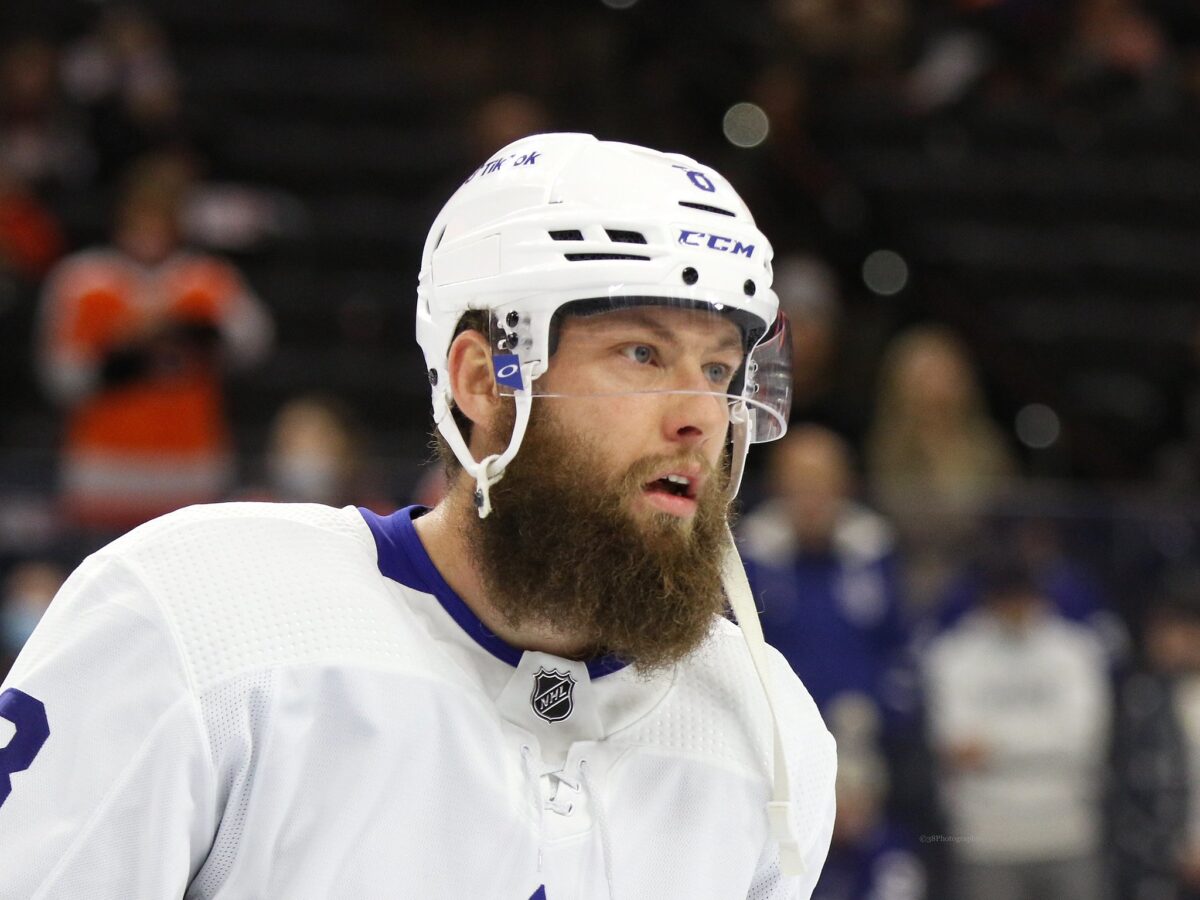On January 28, 2019, Kyle Dubas acquired defenseman Jake Muzzin from the Los Angeles Kings in return for the Maple Leafs’ first-round pick in the 2019 entry draft, forward Carl Grundstrom, and the rights to prospect Sean Durzi.
Adding Muzzin Was a Good Move for the Maple Leafs
Adding Muzzin was lauded as a good move for the Maple Leafs. It gave them a 29-year-old defenseman who had it all. He was strong both offensively, with multiple 40-plus point seasons, and was equally strong defensively. He was also physical, blocked shots, and played on both the power play and the penalty kill for the Kings.
Related: Maple Leafs News & Rumors: Muzzin’s Trade & Campbell’s New Contract?
Muzzin’s arrival immediately impacted the Maple Leafs. He took on the tough defensive assignments and brought sorely needed grit to the back end. He played so well that in February of 2020 he was rewarded with a four-year $22.5 Million extension with the Maple Leafs.
Muzzin’s Style of Play Took Its Toll
This past season it was obvious that Muzzin’s years and hard physical style of play were starting to take their toll. The now 32-year-old Muzzin noticeably struggled when he was healthy enough to play. He also missed 35 games due to injuries – most concerning was his battle with concussions.

To his credit, Muzzin showed signs of his old self during the playoffs. He averaged over 22 minutes a game, registered 25 hits in the seven games versus the Tampa Bay Lightning, and added 16 blocked shots.
Why Trade Muzzin?
Brendan Shanahan stated when he was first hired that his goal was to make the Maple Leafs a perennial Stanley Cup contender. It had been eight years and seven full NHL seasons since he was first hired; and, during that time, the Maple Leafs have had mixed success. Contender they are; winner – not yet.
On the plus side, the team has morphed from a team that had made the playoffs once in eleven seasons to a team that’s only failed to make the playoffs once in seven seasons. The Maple Leafs have become a top-five team in the regular season.
Related: Maple Leafs Not Getting What They Need From Muzzin or Holl
On the negative side, it has been well-documented that they’ve failed to get past the first round of the playoffs in the last six seasons. What has made it even more frustrating for Maple Leafs’ fans is that they’ve taken the last five playoff series to the final game in each of those series, only to lose each and every time. That’s far from good enough for many Maple Leafs’ fans.
The Maple Leafs Improvement on Defense Over the Seasons
Despite those failures, there’s no denying that the 2021-22 version of the Maple Leafs was the best team they’ve iced in close to two decades. While they once more lost out in the first round of the playoffs, that loss was to the juggernaut two-time, cup-defending defending Lightning in a series that was so close it could have easily gone either way.
One area where the Maple Leafs were most improved this season was on defense. They started the season with a top-four of Morgan Rielly, T.J. Brodie, Muzzin, and Justin Holl. Youngsters Rasmus Sandin and Timothy Liljegren battled it out with Travis Dermott for the bottom two jobs.

During the season Dubas pulled a “Russian Bear” out of his hat when he turned a failing Nick Ritchie into solid defenseman Ilya Lyubushkin. Dubas then acquired hometown Mark Giordano at the deadline. Those moves gave the Maple Leafs nine NHL-caliber defensemen before Dubas shipped Dermott off to Vancouver for a third-round pick in the 2022 entry draft.
Following their exit from the postseason, Dubas signed Giordano to a two-year extension for the ridiculously low sum of $800,000 a season. That gives the Maple Leafs a logjam of four players on the left side of their defense in Rielly, Muzzin, Giordano, and Sandin. In a perfect world, it would be nice to keep all four of those players, but it might be difficult to keep them all happy and give them the ice time they desire.
What Will Happen on the Maple Leafs’ Left Side of the Defense
Rielly, with his new eight-year $60 million deal in hand, and the newly-extended Giordano are not going anywhere. That leaves Dubas with an either/or situation with Muzzin and Sandin.
Related: Top Lines in Colorado Avalanche History
We don’t think there’s any argument that right now Muzzin is the better player of the two. But, he’s 33 years old, injury-prone, and costing the Maple Leafs $5.265 million in salary-cap space.
On the other hand, Sandin has yet to prove he can be more than a third-pairing defenseman. That said, he’s only 22 years old and put up solid analytics this past season. In fact, in all situations, Sandin is first on the team in Shot Attempts For (57.1 percent), second on the team in Shots For (55.6 percent), first in Scoring-Chances For (61.8 percent), second in High-Danger Chances For (61.7 percent), second in Goals For (61 percent), and first in Expected-Goals For (62 percent).
Weighing the Numbers and Values to Make a Choice on Defense
The question is whether the team should hold onto an aging Muzzin who, nearing the end of his career, is struggling to play at the level he’s used to; or, should the team invest and trust that Sandin is a young up-and-coming player who has the potential to play another ten seasons?

There’s also money, and more importantly, the salary-cap hit of each player to take into consideration. Sandin is a restricted free agent this summer without arbitration rights. His next deal is projected to be at the maximum in the $2 million range. That’s more than $3 million less than Muzzin makes.
The one thing the Maple Leafs would lose if Muzzin were to go would be his physicality. They could, however, use the $3 million difference to re-sign Lyubushkin. While Lyubushkin is not at the same level as Muzzin in overall ability, he’s more physical, having registered over 200 hits in the regular season and playoffs this past season.
Related: Canadiens Strike Gold With Hiring of Marie-Philip Poulin
How much would the Maple Leafs miss Muzzin? When he was absent from the lineup this past season, the team’s winning percentage was 0.750%. They won three-quarters of the games he missed.
How To Trade Muzzin?
Muzzin has a no-trade clause (NTC) this upcoming season. He’d have to agree to waive his NTC to be traded. But, next season that NTC becomes a modified no-trade clause that allows him to submit a list of ten teams he will not go to, leaving 21 teams he could be traded to with no choice of where he goes.
If he’s dealt this offseason Muzzin would have full say about his landing spot in a trade. He loses that right next season. Dubas could ask Muzzin for a list of teams he’d be willing to play for this upcoming season and then deal with those teams.

One of those teams could be the Los Angeles Kings. Muzzin spent the better part of eight seasons there. It’s not unreasonable to think he (and his family) might like to finish his NHL career and subsequently retire in Southern California.
The Kings also have a number of young defensemen that Muzzin could mentor and help develop. The Kings have over $20 million in cap space to play with. As we’ve mentioned previously, although Muzzin’s salary-cap hit is $5.625 million, after receiving a $2 millon bonus on July 1, Muzzin’s actual pay over the next two seasons will be only $3 million per season.
The Possible Result of a Muzzin Trade
If the Maple Leafs decided to move on from Muzzin and use the extra cap space to extend Lyubushkin, that would also make Justin Holl expendable. Moving Holl would also carry away another $2 million off the team’s salary-cap hit. The team could then begin next season with the defensive setup like the following:
Rielly – Brodie
Giordano – Liljegren
Sandin – Lyubsuhkin
They would also have 27-year-old Carl Dahlstrom as a seventh defenseman if needed, along with a number of younger prospects they could use.
Related: 7 Cool Things About Carey Price
Dubas could also strengthen the team’s depth at defense this offseason or at the deadline next season. Trading Muzzin might not be as impossible a task as some think. It might even be the best thing for the long-term success of the Maple Leafs and, on a personal level, for Muzzin and his family.
[Note: I want to thank long-time Maple Leafs’ fan Stan Smith for collaborating with me on this post. Stan’s Facebook profile can be found here.]
You may also like:
- Trading OEL Makes No Sense for the Maple Leafs
- Insider Suggest Maple Leafs Open to Moving More Players at Trade Deadline
- Maple Leafs News & Rumours: Berube’s Heart, Goaltending & Turning off Rogers
- NHL Rumors: Fox’s Future, Offer for Trocheck, Bruins and Canucks, Oilers Hurdle
- Maple Leafs Week Ahead: Schedule & Storylines – Berube’s Future, Trade Deadline Plans & More